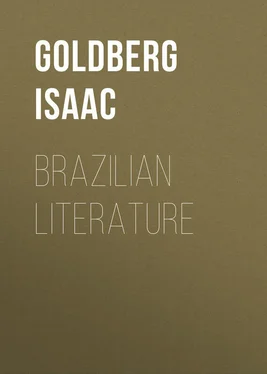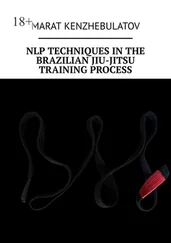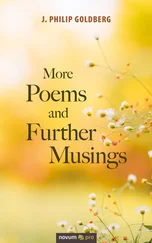Isaac Goldberg - Brazilian Literature
Здесь есть возможность читать онлайн «Isaac Goldberg - Brazilian Literature» — ознакомительный отрывок электронной книги совершенно бесплатно, а после прочтения отрывка купить полную версию. В некоторых случаях можно слушать аудио, скачать через торрент в формате fb2 и присутствует краткое содержание. Жанр: foreign_antique, foreign_prose, на английском языке. Описание произведения, (предисловие) а так же отзывы посетителей доступны на портале библиотеки ЛибКат.
- Название:Brazilian Literature
- Автор:
- Жанр:
- Год:неизвестен
- ISBN:нет данных
- Рейтинг книги:4 / 5. Голосов: 1
-
Избранное:Добавить в избранное
- Отзывы:
-
Ваша оценка:
- 80
- 1
- 2
- 3
- 4
- 5
Brazilian Literature: краткое содержание, описание и аннотация
Предлагаем к чтению аннотацию, описание, краткое содержание или предисловие (зависит от того, что написал сам автор книги «Brazilian Literature»). Если вы не нашли необходимую информацию о книге — напишите в комментариях, мы постараемся отыскать её.
Brazilian Literature — читать онлайн ознакомительный отрывок
Ниже представлен текст книги, разбитый по страницам. Система сохранения места последней прочитанной страницы, позволяет с удобством читать онлайн бесплатно книгу «Brazilian Literature», без необходимости каждый раз заново искать на чём Вы остановились. Поставьте закладку, и сможете в любой момент перейти на страницу, на которой закончили чтение.
Интервал:
Закладка:
It is in connection with the climate of Brazil that her writers have taken Henry Thomas Buckle to task; the passages responsible for the trouble occur in Chapter II of the famous History of Civilization in England , wherein the investigator considers the “influence exercised by physical laws over the organization of society and over the character of individuals.” I quote the original passages from Buckle, and give the refutation, which was originally made by the indefatigable polemist Sylvio Romero.
The trade wind, blowing on the eastern coast of South America, and proceeding from the east, crosses the Atlantic ocean, and therefore reaches the land charged with the vapours accumulated in its passage. These vapours, on touching the shore, are, at periodical intervals, condensed into rain; and as their progress westward is checked by that gigantic chain of the Andes, which they are unable to pass, they pour the whole of their moisture on Brazil, which, in consequence, is often deluged by the most destructive torrents. This abundant supply, being aided by that vast river-system peculiar to the eastern part of America, and being also accompanied by heat, has also stimulated the soil into an activity unequalled in any other part of the world. Brazil, which is nearly as large as the whole of Europe, is covered with a vegetation of incredible profusion. Indeed, so rank and luxuriant is the growth, that Nature seems to riot in the very wantonness of its power… Such is the flow and abundance of life by which Brazil is marked above all other countries of the earth. But, amid this pomp and splendour of Nature, no place is left for Man. He is reduced to insignificance by the majesty with which he is surrounded. The forces that oppose him are so formidable, that he has never been able to make head against them, never able to rally against their accumulated pressure. The whole of Brazil, notwithstanding its immense apparent advantages, has always remained entirely uncivilized, its inhabitants, wandering savages, incompetent to resist these obstacles which the very bounty of Nature had put in their way… The mountains are too high to scale, the rivers are too wide to bridge; everything is contrived to keep back the human mind, and repress its rising ambition. It is thus that the energies of Nature have hampered the spirit of Man. Nowhere else is there so painful a contrast between the grandeur of the external world and the littleness of the internal. And the mind, cowed by this unequal struggle, has not only been unable to advance, but without foreign aid it would undoubtedly have receded. For even at present, with all the improvements constantly introduced from Europe, there are no real signs of progress… These considerations explain why it is, that in the whole of Brazil there are no monuments even of the most imperfect civilization; no evidence that the people had, at any period, raised themselves above the state in which they were found when their country was first discovered.
In his Historia da Litteratura Brasileira , 8 8 Rio. 1902. (2a Edição, melhorada pelo auctor.)
Romero devotes his third chapter to setting Buckle right. Brazil, he declares, far from suffering excessive rainfall, is subject to calamitous and destructive droughts. The Englishman, who never visited Brazil, errs likewise in his conception of the country’s natural wonders, which he exaggerates in the traditional fashion that was handed down by the earliest comers. Despite the presence of the Amazon, the rivers in general are small, not the largest in the world; the mountains, similarly, far from rearing their crests into unattainable cloudy heights, are of the fourth and fifth order when compared with their fellows of the old world or the new. Neither are the animals in Brazil more gigantic and ferocious than elsewhere. “Our fauna,” writes Romero, “is neither the richest nor the most terrible in the world. We haven’t the elephant, the camel, the hippopotamus, the lion, the tiger, the rhinoceros, the zebra, the giraffe, the buffalo, the gorilla, the chimpanzee, the condor and the eagle.” Buckle speaks of Brazil’s unrivalled fertility as an impediment; the truth is that her fertility is not unrivalled, nor is it an impediment. In conclusion, “Buckle is right in the picture he draws of our backwardness, but wrong in the determination of its causes.” According to Romero, three chief reasons are to be adduced; these are (1) natural, (2) ethnic and (3) moral. To the first belongs the excessive heat, in conjunction with the droughts in the major part of the country, as well as the malignant fevers prevalent on the coast. Chief among the second is the “relative incapacity” of the three races that comprise the population. To the last belong the “historic factors called politics, legislation, habits, customs, which are effects that afterward act as causes.”
Ronaldo de Carvalho 9 9 Op. Cit. 16-17.
considers Romero’s reply somewhat timid, inasmuch as he accepts, erroneously, many of Buckle’s conclusions. Buckle’s passage “is not, as it appeared to the illustrious Brazilian writer, ‘true in a general sense.’ Yet it should ‘be meditated upon by all Brazilians’, that they may see what a dangerous snare it is to rely so much, in our inveterate fondness for things foreign, upon the notions imported from the intellectual markets on the other side of the Atlantic… Buckle’s error consisted in considering the evolution of peoples solely under the influence of physical and geographical factors; more enduring than these are the ethnico-historical factors, which are much more important and far more powerful than the first.” De Carvalho adds little to Romero’s refutation, which, in substance, he repeats. At the time that Buckle’s first volume was originally published (1857), Brazilian literature had long entered upon an autonomous career and was in the throes of Romanticism, which in Brazil was an era of intense and highly fruitful production. He can hardly be blamed for his ignorance on this score, when an authority like Ferdinand Wolf, writing his Le Brésil Litteraire some six years later, is accused by the querulous Romero of setting down many laughable exaggerations.
Three ethnic strains have combined to produce the Brazilian of today: (1) the Portuguese, (2) the native Indian, (3) the African Negro, who was brought in as a slave by the Portuguese.
The native element, known as the Brazilian-Guarany, at the time of the discovery knew no metals; they possessed a rudimentary knowledge of weaving, and some of them practised ceramics; their instruments were of polished stone, and their fishing and hunting implements were of the most primitive. The form of organization was rough. “Some spoke a rich language of delicate accents and varied expression; they had traditional customs and were skilful in the arts of war and peace; others, however, were coarse, deficient in culture, roaming in nomadic bands along the coast or amidst the high sertões. Some respected certain rules of morality and religion, in which, for example, the family ties were sacred…” 10 10 De Carvalho. Op. Cit. P. 27.
Others dwelt in a certain “embryonic socialism” which permitted free love and the participation of woman in masculine pursuits. Ethnologists are not agreed upon the religious status of the tribes, hovering between the hypotheses of polytheism and anthropomorphic animism; the latter is more likely.
The Portuguese came at the height of their national glory. The sixteenth century, famed among them for its physical prowess, is also the epoch of Camões, Sá de Miranda, Bernardim Ribeiro and Gil Vicente. As to the Negro, his history in Brazil is much the same as that of the black slave in the United States, except that, owing to the proportions of interbreeding, the “color line” is less tightly drawn in the southern republic.
Читать дальшеИнтервал:
Закладка:
Похожие книги на «Brazilian Literature»
Представляем Вашему вниманию похожие книги на «Brazilian Literature» списком для выбора. Мы отобрали схожую по названию и смыслу литературу в надежде предоставить читателям больше вариантов отыскать новые, интересные, ещё непрочитанные произведения.
Обсуждение, отзывы о книге «Brazilian Literature» и просто собственные мнения читателей. Оставьте ваши комментарии, напишите, что Вы думаете о произведении, его смысле или главных героях. Укажите что конкретно понравилось, а что нет, и почему Вы так считаете.












